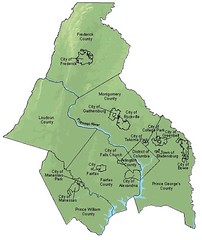Metropolitan thinking to cure “urbanitis”

Posted November 12, 2008 at 5:33PM
One of the biggest challenges to solving sprawl and addressing the many social and environmental issues that accompany growth is the plethora of jurisdictions that complicate regional thinking. The environment doesn't respect political boundaries and neither does unemployment or commuting patterns. Yet most land use decisions and many others in the US are made at the most local of levels, creating conflicts, competition and apathy that prevents cooperative solutions.
For example, implementing smarter, more sustainable development patterns means choosing some places in metro regions to protect and others to develop, some intensely. It means deciding on the best places for some shared regional assets such as symphony orchestras, stadiums, parks and airports. It means making decisions about watersheds and transportation infrastructure. The private market is terrible at making these decisions and so, frequently, are local councils with no responsibility to the region as a whole.
In the DC area alone, just to drive out to the suburbs to visit my in-laws involves exiting the District of Columbia, traversing part of Montgomery County,  Maryland, crossing the Potomac River into the Commonwealth of Virginia and, depending on which route I take, potentially crossing parts of Arlington and Fairfax Counties along with the city of Falls Church before arriving in Fairfax City. Residents don't even notice when we pass from one to another, but every one of those jurisdictions has its own set of laws and land use controls.
Maryland, crossing the Potomac River into the Commonwealth of Virginia and, depending on which route I take, potentially crossing parts of Arlington and Fairfax Counties along with the city of Falls Church before arriving in Fairfax City. Residents don't even notice when we pass from one to another, but every one of those jurisdictions has its own set of laws and land use controls.
This is why I called for more emphasis on regional planning at the metropolitan scale in my agenda for the next administration. Now, I'm certainly not claiming these ideas are original with me. I've just been influenced not only by what I see around me but also by some very smart thinkers, such as Peter Calthorpe (The Next American Metropolis, 1993), my 2007 co-author Jonathan Barnett (The Fractured Metropolis, 1996) and Myron Orfield (Metropolitics, 1997), whose work I read when I became interested in these issues back in the 1990s.
And I am very pleased that the president-elect recognized the need to address "the new metropolitan reality" during his campaign.
So it is timely that William E. Finley, who led the planning of the idealistic-for-its-time new town of Columbia, Maryland, has emerged with some more good thinking and proposals for regionalism in his new book, Curing Urbanitis: the Metropolitan Disease.
Writing about his ideas on Planetizen.com, Finley proposes that Congress charter a new nationwide non-profit corporation to administer metropolitan planning and incentive grants to existing local governments. Finley proposes that the new corporation help regions tackle several specific issues, paraphrased here:
1. Urban Sprawl will only be halted after a regional entity has the legal and financial powers to prevent development in certain areas and to pay for development rights or other financial arrangements. "See the Portland, OR experience."
2. "Dangerous Neighborhoods cannot be solved by the center city alone but will require regional leadership and resources to provide massive personal, family and organizational counseling, recruiting, job training, financial support, educational innovations, unified services and a
generation of consistent efforts to assist people to become useful and productive citizens and move up and out of the neighborhood. See the Harlem Childrens' Zone on the web."
3. Traffic Congestion is caused by one-person cars, auto and oil lobbies, subsidized parking, low gas taxes, political opposition to rapid transit, Federal and State failures to assist metro areas and the lack of regional leadership.
4. Air Pollution can only be remedied by the removal of polluters, that is, too many cars, trucks and buses with combustion engines, industrial plants, forest fires and airborne dust. "No city or suburb can solve this without Federal and State participation, again, without regional leadership."
5. Affordable Housing that allows middle income people to live reasonably close to workplaces "will only come about when a regional entity is given the task and the financing to buy, build, and redevelop homes and apartments for that target population. Utilizing the concept of a large-scale Community Land Trust may be the answer."
6. "One of the mysteries of American life is the consistent willingness to shortchange public education at all levels. The movement toward private schools and ultra-rich universities is exacerbating the trend. Our failure to pay professional teachers a professional wage, to rely on stingy State legislatures to finance schools and to totally turn our metropolitan backs on nearly criminal conditions in many inner city schools systems is undermining the foundations of the American Dream, not to mention our competitive global abilities."
7. "Our failure to recognize the absolute inability of cities and suburbs to solve what are clearly regional problems is because no one blows the whistle. Take a deep breath and blow!!"
He makes a compelling case.